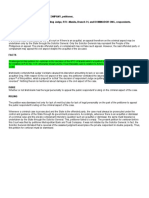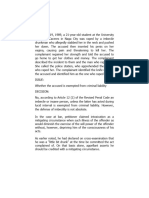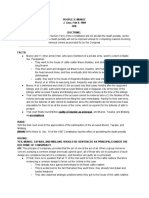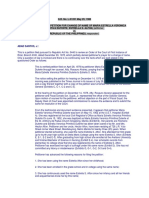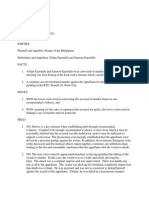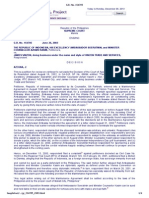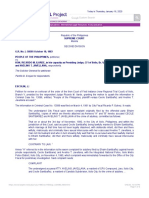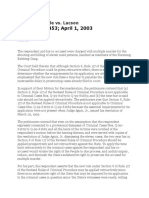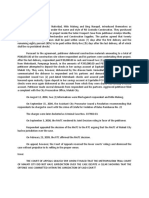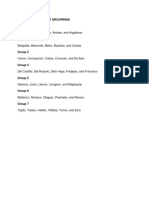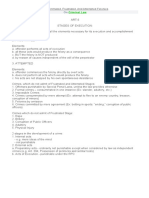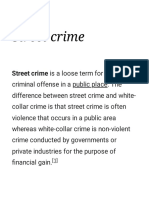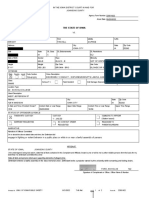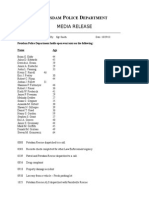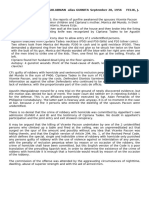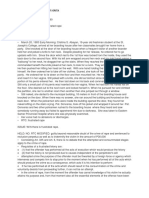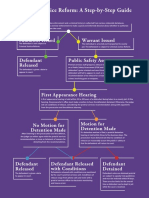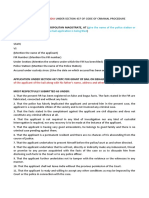0 ratings0% found this document useful (0 votes)
84 viewsPeople Vs Lacson
People Vs Lacson
Uploaded by
Nick CunananPanfilo Lacson was charged with multiple murder for the shooting of eleven members of the Kuratong Baleleng Gang. The criminal cases against him were provisionally dismissed in 1999. Lacson argued that Section 8 of Rule 117, which provides for a time-bar for case revival after provisional dismissal, should apply retroactively to his cases. The Supreme Court ruled that 1) the requisites for provisional dismissal under Section 8 were not met in Lacson's cases and 2) Section 8 should not be applied retroactively as it would deprive the State of the full two years to revive the cases allowed under the new rule.
Copyright:
© All Rights Reserved
Available Formats
Download as PDF, TXT or read online from Scribd
People Vs Lacson
People Vs Lacson
Uploaded by
Nick Cunanan0 ratings0% found this document useful (0 votes)
84 views2 pagesPanfilo Lacson was charged with multiple murder for the shooting of eleven members of the Kuratong Baleleng Gang. The criminal cases against him were provisionally dismissed in 1999. Lacson argued that Section 8 of Rule 117, which provides for a time-bar for case revival after provisional dismissal, should apply retroactively to his cases. The Supreme Court ruled that 1) the requisites for provisional dismissal under Section 8 were not met in Lacson's cases and 2) Section 8 should not be applied retroactively as it would deprive the State of the full two years to revive the cases allowed under the new rule.
Original Description:
Digest case
Original Title
People vs Lacson
Copyright
© © All Rights Reserved
Available Formats
PDF, TXT or read online from Scribd
Share this document
Did you find this document useful?
Is this content inappropriate?
Panfilo Lacson was charged with multiple murder for the shooting of eleven members of the Kuratong Baleleng Gang. The criminal cases against him were provisionally dismissed in 1999. Lacson argued that Section 8 of Rule 117, which provides for a time-bar for case revival after provisional dismissal, should apply retroactively to his cases. The Supreme Court ruled that 1) the requisites for provisional dismissal under Section 8 were not met in Lacson's cases and 2) Section 8 should not be applied retroactively as it would deprive the State of the full two years to revive the cases allowed under the new rule.
Copyright:
© All Rights Reserved
Available Formats
Download as PDF, TXT or read online from Scribd
Download as pdf or txt
0 ratings0% found this document useful (0 votes)
84 views2 pagesPeople Vs Lacson
People Vs Lacson
Uploaded by
Nick CunananPanfilo Lacson was charged with multiple murder for the shooting of eleven members of the Kuratong Baleleng Gang. The criminal cases against him were provisionally dismissed in 1999. Lacson argued that Section 8 of Rule 117, which provides for a time-bar for case revival after provisional dismissal, should apply retroactively to his cases. The Supreme Court ruled that 1) the requisites for provisional dismissal under Section 8 were not met in Lacson's cases and 2) Section 8 should not be applied retroactively as it would deprive the State of the full two years to revive the cases allowed under the new rule.
Copyright:
© All Rights Reserved
Available Formats
Download as PDF, TXT or read online from Scribd
Download as pdf or txt
You are on page 1of 2
PEOPLE VS PANFILO LACSON
GR. No. 149453, April 1, 2003
Facts - Panfilo Lacson and his co-accused were charged with
multiple murder for the shooting and killing of eleven male persons
bandied as members of the Kuratong Baleleng Gang.
The said cases docketed as Criminal Cases Nos. Q-99-81679 to Q-
99-81689 were provisionally dismissed with the express consent of the
respondent as he himself moved for said provisional dismissal when he
filed his motion for judicial determination of probable cause and for
examination of witnesses.
Respondent asserts that the new rule under Section 8 of Rule 117
of the Revised Rules of Criminal Procedure may be applied retroactively
since there is no substantive right of the State that may be impaired by
its application to the criminal cases in question.The Court held therein that
although Section 8, Rule 117 of the Revised Rules of Criminal Procedure
could be given retroactive effect there is still a need to determine whether
the requirements for its application are attendant.
According to the respondent, penal laws, either procedural or
substantive, may be retroactively applied so long as they favor the
accused. He asserts that the two-year period commenced to run on March
29, 1999 and lapsed two years thereafter was more than reasonable
opportunity for the State to fairly indict him.The Court agrees with the
respondent that procedural laws may be applied retroactively. As applied
to criminal law, procedural law provides or regulates the steps by which
one who has committed a crime is to be punished. It further ruled therein
that a procedural law may not be applied retroactively if to do so would
work injustice or would involve intricate problems of due process or impair
the independence of the Court.
Remedial legislation, or procedural rule, or doctrine of the Court
designed to enhance and implement the constitutional rights of parties in
criminal proceedings may be applied retroactively or prospectively
depending upon several factors, such as the history of the new rule,... its
purpose and effect, and whether the retrospective application will further
its operation, the particular conduct sought to be remedied and the effect
thereon in the administration of justice and of criminal laws in particular.
ISSUES - 1. Is the requisite for applicability of Section 8, Rule 117
were met? 2. Is the time-bar rule in Section 8, Rule 117 should be applied
retroactively?
RULING- 1. No, the requisites were not met. Under Sec. 8.
Provisional dismissal. A case shall not be provisionally dismissed except with the q
express consent of the accused and with notice to the offended party.
The provisional dismissal of offenses punishable by imprisonment not exceeding six
(6) years or a fine of any amount, or both, shall become permanent one (1) year after
issuance of the order without the case having been revived. With respect to offenses
punishable by imprisonment of more than six (6) years, their provisional dismissal shall
become permanent two (2) years after issuance of the order without the case having
been revived.
Having invoked said rule before the petitioners-panel of prosecutors and
before the Court of Appeals, the respondent is burdened to establish the
essential requisites of the first paragraph thereof, namely:
1. the prosecution with the express conformity of the accused or the accused
moves for a provisional (sin perjuicio) dismissal of the case; or both the
prosecution and the accused move for a provisional dismissal of the case;
2. the offended party is notified of the motion for a provisional dismissal of the
case;
3. the court issues an order granting the motion and dismissing the case
provisionally;
4. the public prosecutor is served with a copy of the order of provisional
dismissal of the case.
Specifically, the respondent failed to prove that the conditions
stated in the first paragraph were met at the time that the provisional
dismissal was granted. In fact, in the CA hearing on July 31, 2001, the
respondent, through counsel, categorically declared that he did not file
the motion to dismiss the criminal cases against him nor did he agree to
a provisional dismissal of same. 2. No, Section 8, Rule 117 should NOT
be given retroactive effect. By the time that the Rule was promulgated,
the State only had 1 year and 3 months to contest the provisional
dismissal, rather than the stipulated 2 years. As such, the Court ruled that
the period of April 1, 1999 to November 20, 1999 should be excluded in
the 2 year computation for case revival. To quote Justice Frankfurter in
Griffin vs. People: “We should not indulge in the fiction that the law
announced has always been the law, and therefore, that those who did
not avail themselves of it waived their rights.”
You might also like
- The Trial Process in KenyaDocument8 pagesThe Trial Process in KenyaMuthoni60% (5)
- Booking Report 3-31-2021Document3 pagesBooking Report 3-31-2021WCTV Digital TeamNo ratings yet
- Criminal Law 1 Outline PartialDocument65 pagesCriminal Law 1 Outline PartialLara De los Santos100% (1)
- People VS Lacson - DigestDocument1 pagePeople VS Lacson - DigestJhuniven OrantesNo ratings yet
- Crim Pro October 21Document3 pagesCrim Pro October 21Juan Carlo Castaneda100% (1)
- City of Baguio Vs Marcos, 27 SCRA 342, G.R. No. L-26100, February 28, 1969Document1 pageCity of Baguio Vs Marcos, 27 SCRA 342, G.R. No. L-26100, February 28, 1969Gi NoNo ratings yet
- Tort 1st Set Case DigestsDocument5 pagesTort 1st Set Case DigestsRio AborkaNo ratings yet
- HEIRS OF GEVERO v. GADECODocument2 pagesHEIRS OF GEVERO v. GADECOHannah EscuderoNo ratings yet
- Lumanog V PeopleDocument1 pageLumanog V PeoplearpiNo ratings yet
- Panaguiton V DOJDocument4 pagesPanaguiton V DOJCinja ShidoujiNo ratings yet
- Primicias Vs UrdanetaDocument2 pagesPrimicias Vs UrdanetaRae Angela GarciaNo ratings yet
- U.S. vs. Basco, G.R. No. 2747 - DigestDocument1 pageU.S. vs. Basco, G.R. No. 2747 - DigestArante Joy GraceNo ratings yet
- Done - 14. Metrobank v. VeridianoDocument1 pageDone - 14. Metrobank v. VeridianosophiaNo ratings yet
- Statcon Cases DigestDocument7 pagesStatcon Cases DigestRaakista18 SWNo ratings yet
- 9 Garcia v. CADocument2 pages9 Garcia v. CAShiela VenturaNo ratings yet
- Balaba vs. PeopleDocument1 pageBalaba vs. PeopleMACNo ratings yet
- Integrated Bar of The Philipines Code of Professional Responsibility Chapter I. The Law and SocietyDocument8 pagesIntegrated Bar of The Philipines Code of Professional Responsibility Chapter I. The Law and SocietyKleyr De Casa AlbeteNo ratings yet
- Danilo E. Paras, Commission On Elections,: G.R. No. 123169 November 4, 1996Document15 pagesDanilo E. Paras, Commission On Elections,: G.R. No. 123169 November 4, 1996Aleph JirehNo ratings yet
- People vs. Buenaflor (CA, 53 0.G. 8877)Document1 pagePeople vs. Buenaflor (CA, 53 0.G. 8877)Drimtec TradingNo ratings yet
- People v. MunozDocument2 pagesPeople v. MunozBeshieNo ratings yet
- Torres vs. GonzalesDocument1 pageTorres vs. GonzalesMingNo ratings yet
- Statcon Case 51-55Document18 pagesStatcon Case 51-55NingClaudioNo ratings yet
- PCDS Vs Carandang, G.R. No. 206958, Nov 8, 2017Document2 pagesPCDS Vs Carandang, G.R. No. 206958, Nov 8, 2017Rhea Mae A. SibalaNo ratings yet
- People VS AbalosDocument2 pagesPeople VS AbalosblessaraynesNo ratings yet
- PP Vs Esponilla 404 Scra 421Document1 pagePP Vs Esponilla 404 Scra 421Johnry ParillaNo ratings yet
- ArticleVISection26 - de GuzmanvsCOMELEC DigestDocument1 pageArticleVISection26 - de GuzmanvsCOMELEC DigestMary DennNo ratings yet
- People vs. IbañezDocument1 pagePeople vs. IbañezAaliyahNo ratings yet
- Manila Jockey Club v. Games and Amusement Board 107 Phil. 151 1960 Dado Arthur Jhon A.Document1 pageManila Jockey Club v. Games and Amusement Board 107 Phil. 151 1960 Dado Arthur Jhon A.Mike TeeNo ratings yet
- ALBINO CUNANAN ET AL., March 18, 1954Document51 pagesALBINO CUNANAN ET AL., March 18, 1954junel villanuevaNo ratings yet
- Stat Con Enrolled Bill Theo To Journal Entry RuleDocument4 pagesStat Con Enrolled Bill Theo To Journal Entry RuleNina Majica PagaduanNo ratings yet
- Mariano vs. People, G.R. No. 224102Document10 pagesMariano vs. People, G.R. No. 224102Hendrix TilloNo ratings yet
- Rule 124 - Procedure in The Court of AppealsDocument7 pagesRule 124 - Procedure in The Court of Appealsanjonesss aypssNo ratings yet
- Del Castillo vs. PeopleDocument3 pagesDel Castillo vs. Peopleapplegee liboonNo ratings yet
- G.R. No. L-51797 May 16, 1983 THE PEOPLE OF THE PHILIPPINES, Plaintiff-Appellee JOSE VERDAD Alias ALFREDO VERDAD, Defendant-AppellantDocument5 pagesG.R. No. L-51797 May 16, 1983 THE PEOPLE OF THE PHILIPPINES, Plaintiff-Appellee JOSE VERDAD Alias ALFREDO VERDAD, Defendant-AppellantEmily MontallanaNo ratings yet
- Feliciano v. PasicolanDocument3 pagesFeliciano v. PasicolanAndotNo ratings yet
- Government of Hong Kong Special Administrative Region v. Olalia JR., G.R 153675, Apr. 19, 2007 DigestDocument2 pagesGovernment of Hong Kong Special Administrative Region v. Olalia JR., G.R 153675, Apr. 19, 2007 DigestzanjknightNo ratings yet
- 10 Digest For Stat ConDocument4 pages10 Digest For Stat ConAbbie KwanNo ratings yet
- 5 - Indonesia vs. Vinzon G.R. No. 154705Document4 pages5 - Indonesia vs. Vinzon G.R. No. 154705Rea Jane B. MalcampoNo ratings yet
- Castro Vs JBC Case DigestDocument80 pagesCastro Vs JBC Case DigestRob ClosasNo ratings yet
- 2018 Sioco - v. - People20180417 1159 1rkys4wDocument4 pages2018 Sioco - v. - People20180417 1159 1rkys4wPark Chael Reose Eonni0% (1)
- G R - No - L-58595Document5 pagesG R - No - L-58595Henry LNo ratings yet
- Leonen, J.: People V. Cogaed G.R. NO. 200334, 30 of July, 2014Document3 pagesLeonen, J.: People V. Cogaed G.R. NO. 200334, 30 of July, 2014EPZ RELANo ratings yet
- Legrama V Sandiganbayan GR 178626 CrimDocument3 pagesLegrama V Sandiganbayan GR 178626 CrimKayee KatNo ratings yet
- Domingo vs. Sandiganbayan: Suggest CategoryDocument5 pagesDomingo vs. Sandiganbayan: Suggest CategoryCedrickNo ratings yet
- People Vs YumanDocument4 pagesPeople Vs YumanKM MacNo ratings yet
- Ramiscal vs. SandiganbayanDocument2 pagesRamiscal vs. SandiganbayanJenica Jae De VeraNo ratings yet
- Lito Corpuz v. People of The Philippines, G.R. No.Document2 pagesLito Corpuz v. People of The Philippines, G.R. No.Samuel WalshNo ratings yet
- Macasaet v. People, 452 SCRA 255Document11 pagesMacasaet v. People, 452 SCRA 255JNo ratings yet
- Cemeco Vs National LifeDocument3 pagesCemeco Vs National LifeIanNo ratings yet
- FF Mañacop Const Co Inc Vs CA 122196Document2 pagesFF Mañacop Const Co Inc Vs CA 122196Kristine KristineeeNo ratings yet
- Tan V Gal 43 SCRA 677, Feb29'72Document1 pageTan V Gal 43 SCRA 677, Feb29'72BudoyNo ratings yet
- Pedro Cupcupin Vs PeopleDocument1 pagePedro Cupcupin Vs PeoplejilliandanielleNo ratings yet
- 168 People v. Munoz, 170 SCRA 107 (1989)Document2 pages168 People v. Munoz, 170 SCRA 107 (1989)Princess Marie FragoNo ratings yet
- Oblicon Syllabus 2014-2015 (Second Semester)Document11 pagesOblicon Syllabus 2014-2015 (Second Semester)Anthony GoquingcoNo ratings yet
- Crim Law Review Midterm CasesDocument10 pagesCrim Law Review Midterm CasesMercy LingatingNo ratings yet
- G.R. No. 202867 July 15, 2013 People of The Philippines, Appellee, REGIE LABIAGA, Appellant. Carpio, J.Document5 pagesG.R. No. 202867 July 15, 2013 People of The Philippines, Appellee, REGIE LABIAGA, Appellant. Carpio, J.Mark Lester Lee AureNo ratings yet
- People v. SabilulDocument2 pagesPeople v. SabilulKimmyNo ratings yet
- Veroy v. LayagueDocument2 pagesVeroy v. LayagueCarissa Cruz0% (1)
- Duncano v. SandiganbayanDocument2 pagesDuncano v. SandiganbayanMarinelle Aycee Moleta Perral100% (1)
- Jimenez v. PeopleDocument2 pagesJimenez v. PeopleRidzanna AbdulgafurNo ratings yet
- People vs. Lacson, Case DigestDocument4 pagesPeople vs. Lacson, Case DigestPau LoboNo ratings yet
- Facts:: PEOPLE OF THE PHILIPPINES vs. PANFILO M. LACSON, Respondent. (G.R. No. 149453. April 1, 2003)Document4 pagesFacts:: PEOPLE OF THE PHILIPPINES vs. PANFILO M. LACSON, Respondent. (G.R. No. 149453. April 1, 2003)EANo ratings yet
- Facts:: PEOPLE v. PANFILO M. LACSON, GR No. 149453, 2003-04-01Document9 pagesFacts:: PEOPLE v. PANFILO M. LACSON, GR No. 149453, 2003-04-01Kimberly SendinNo ratings yet
- CANCERAN VS PPDocument2 pagesCANCERAN VS PPNick CunananNo ratings yet
- Morillo V PPDocument2 pagesMorillo V PPNick CunananNo ratings yet
- Style Matters: A Review Essay On Legal Writing: Yale Law JournalDocument28 pagesStyle Matters: A Review Essay On Legal Writing: Yale Law JournalNick CunananNo ratings yet
- Corporation Law (Business Organization Ii1: I. Nature and FormationDocument3 pagesCorporation Law (Business Organization Ii1: I. Nature and FormationNick CunananNo ratings yet
- Admin Final Project GroupingsDocument1 pageAdmin Final Project GroupingsNick CunananNo ratings yet
- Topic: Permissible Delegation: Administrative ProcedureDocument3 pagesTopic: Permissible Delegation: Administrative ProcedureNick CunananNo ratings yet
- 7 PolicereportDocument1 page7 Policereportapi-327762198No ratings yet
- PP vs. MondigoDocument3 pagesPP vs. MondigoElaine Aquino Maglaque0% (1)
- Consummated, Frustrated, AttemptedDocument3 pagesConsummated, Frustrated, AttemptedVon Ember Mc MariusNo ratings yet
- Street Crime - WikipediaDocument16 pagesStreet Crime - WikipediaAk AsfandNo ratings yet
- York County Court Schedule For Oct. 4, 2013Document25 pagesYork County Court Schedule For Oct. 4, 2013York Daily Record/Sunday NewsNo ratings yet
- Travell Wright Criminal Complaint For Attack On TPUSA EventDocument4 pagesTravell Wright Criminal Complaint For Attack On TPUSA EventThe College FixNo ratings yet
- Not PrecedentialDocument24 pagesNot PrecedentialScribd Government Docs100% (1)
- Criminal Liability Reading List 2023 MR KasiluDocument23 pagesCriminal Liability Reading List 2023 MR KasiluAtwebembire JassyNo ratings yet
- Potsdam Police Dept. Blotter Oct. 29, 2013Document2 pagesPotsdam Police Dept. Blotter Oct. 29, 2013NewzjunkyNo ratings yet
- People Vs Rillorta DigestDocument2 pagesPeople Vs Rillorta DigestRussell John Hipolito100% (2)
- Forensic PhotographyDocument16 pagesForensic PhotographySimona LeafuNo ratings yet
- Santos v. Orda: Case Digest by Gennard Michael Angelo A. AngelesDocument2 pagesSantos v. Orda: Case Digest by Gennard Michael Angelo A. AngelesGennard Michael Angelo AngelesNo ratings yet
- Criminal Law Notes 2020Document7 pagesCriminal Law Notes 2020Kim WaNo ratings yet
- Group-24-Lea-1 20240121 230311 0000Document16 pagesGroup-24-Lea-1 20240121 230311 0000Cheche Gabato EspinosaNo ratings yet
- Peoria County Jail Booking Sheet For Sept. 24, 2016Document5 pagesPeoria County Jail Booking Sheet For Sept. 24, 2016Journal Star police documentsNo ratings yet
- People V Mangulabnan 99 Phil 992 Digest PDF FreeDocument3 pagesPeople V Mangulabnan 99 Phil 992 Digest PDF FreeRafael GonzalesNo ratings yet
- People of The Philippines Vs OritaDocument2 pagesPeople of The Philippines Vs OritaFrancis Coronel Jr.No ratings yet
- Bail Reform Check Sheet Courtesy of NJ CourtsDocument1 pageBail Reform Check Sheet Courtesy of NJ Courtsjmjr30No ratings yet
- Crim Cases 1-10Document23 pagesCrim Cases 1-10katchmeifyoucannotNo ratings yet
- 36 Phil 210, US Vs EduaveDocument3 pages36 Phil 210, US Vs EduavegcantiverosNo ratings yet
- Week 13Document18 pagesWeek 13Randall Lyn BlascoNo ratings yet
- Stephanie Rapkin ComplaintDocument2 pagesStephanie Rapkin ComplaintTMJ4 NewsNo ratings yet
- Bail Application Format India Under Section 437 of Code of Criminal ProcedureDocument2 pagesBail Application Format India Under Section 437 of Code of Criminal ProcedureHari Om Maratha0% (1)
- Ladonga VS People DigestDocument2 pagesLadonga VS People Digesttink echivere0% (1)
- Pr1 (Research Proposal)Document16 pagesPr1 (Research Proposal)danilo jr siquigNo ratings yet
- PP vs. CalatesDocument8 pagesPP vs. CalatesStef OcsalevNo ratings yet
- Amici LawDocument70 pagesAmici Lawkimkimkoui100% (2)












